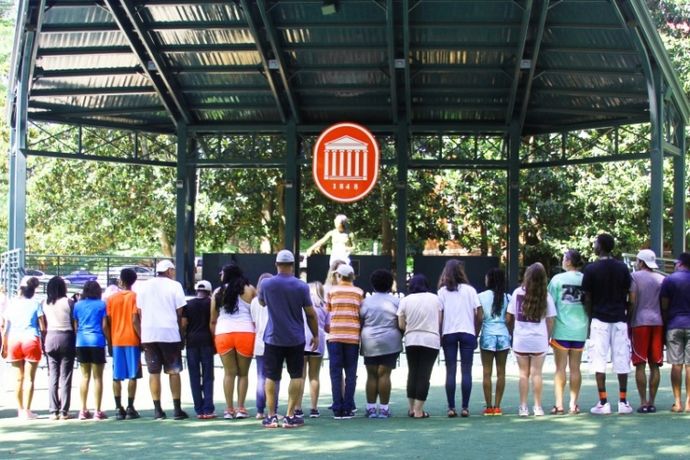"Young People - Like My Students - Can Make Such A Difference In The World"
Four of TFA-Mississippi's corps members served as mentors with the Summer Youth Institute at the William Winter Institute during the summer of 2016. This annual program brings a diverse group of high school sophomores and juniors from around Mississippi - including students from public and private schools, from the Gulf Coast to the Delta to the northern hills, of all races - to the University of Mississippi for a nine-day program on leadership development, community building, and civic engagement.
Van Gordon, youth engagement coordinator with the William Winter Institute says that in his discussions with students, one of the first problems they bring up is their quality of their schools. Which is one reason why he loves having TFA corps members work as mentors.
“That understanding of education issues is essential,” Gordon says. “I’m always impressed by the diversity of the corps members who work with us—they each probably a different strength to our program.”
We sat down with Kelly Kirby (TFA-MS ’15), who teaches middle school English at Williams Sullivan Elementary in Durant, Mississippi to hear about her experience as a mentor.

How did your interest in the Summer Youth Institute intersect with your work in the classroom?
I had done similar work previously, as a mentor with City Year in Los Angeles. But I think the emphasis on social justice in TFA helped me get in the right mindset—if I hadn’t been involved with TFA, or if TFA hadn’t had that strong emphasis on social justice and illuminating the potential that exists here in Mississippi, I doubt I would have applied for the program. It got me fired up to find new ways to help encourage change here in Mississippi.
Did your experience this summer cause you to look at your work differently?
It did. It’s easy to say, “Mississippi is just what I see in my classroom.” But that isn’t Mississippi—that’s a small part of the state. This summer, I got to see all the different strengths people have. That was something that really amazed me, and encouraged me. Now that I’m back in my classroom, I see sparks of all that potential in my own students. I see more potential in my community than I did last year.
Did you make concrete changes in your classroom this year?
A big change is the incorporation of something called Welcome Table Guideposts. These are a structure for sharing and listening—they use personal stories to help students get to know one another. They’re also a great tool for making sure discipline is restorative instead of punitive. I want to make sure everyone in my class feels included, and that everyone is deeply listening to one another.
What other ways have you changed your approach to classroom culture?
Instead of judging one another, we “turn to wonder.” I model this for my students. If some of my students are doing something that may not be the most productive, I’ll say, “I wonder why students are doing that?” instead of just, “Stop doing that.” I’m not scolding them—I’m encouraging self-reflection. It’s made a really positive shift in my culture this year.
Any other big takeaways?
If there’s any one thing that really stood out to it was the importance of young people. They’re the leaders of change. Seeing the Children’s Crusade, and how young people in Birmingham had this huge impact; learning about lunch-counter sit-ins, which were all started by young people. Even Martin Luther King, Jr., was in just his 30s when he came to prominence as a leader. Young people—like my students—can make such a difference in the world.
You have a Master’s degree in education, and could have taught anywhere. What has been most valuable about teaching in Mississippi?
The more you know about these issues, and about the different cultures that make up our country, the easier time you’ll have working in diverse settings, or working with a variety of people. My time in Mississippi has given me a much broader and deeper understanding, particularly of the cultural and historical components that much up the racial and socioeconomic disparities we see in our country. It’s emphasized in our TFA training—and I was able to see it through my work with the William Winter Institute, as well.
Applications are now open for the Exploring Equity Collaborative, in which first year corps members can earn a similar experience by participating in their choice of social justice, education, and health organizations in Mississippi. Use our "contact us" form to find out more!


